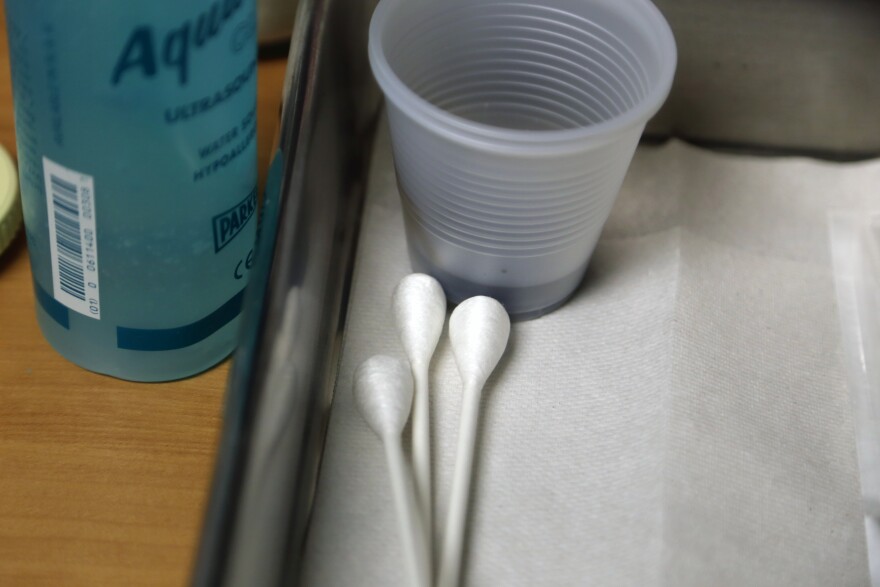Gynecologist Colleen Krajewski tells anyone who will listen -- intrauterine devices are "the Cadillac of birth control right now.”
Dr. Krajewski, 35, family planning specialist for the Center for Contraception and Family Planning at Magee Women's Hospital of UPMC, said she’ll support any patient who wants an IUD, but she'd rather it be the result of careful consideration and consultation with her doctor.
“I don't want anyone to make a choice based on this election,” she said.
But lots of women are.

IUDs in demand
Google reported a massive spike the week after Trump took the presidency in people searching for IUDs and birth control. A smaller increase is being tracked this week, just before the inauguration and a few days after Congress passed a preliminary budget measure that lawmakers vow is the first step to repealing the Affordable Care Act, which included a mandate that required health insurance providers to cover expensive contraceptives.
Planned Parenthood reported a 900 percent increase since the election in patients nationwide requesting the device. They tried to track it on the local level, but it’s tricky. Spokeswoman Jessica Semler said phone operators aren’t allowed to ask patients why they’re making an appointment.
UPMC doctors like Krajewski noticed a spike in Pittsburgh, too. Media relations manager Amy Charley said last month the hospital group was initially stumped about how to calculate it, so they tried going through the billing departments.Allegheny Health Network tracked a 60 percent bump from November to December, but spokeswoman Stephanie Waite said they’re hesitant to attribute it to the election alone.
Magee OBGYN Dr. Nancy McBride isn’t so cautious. The effect was “pretty much immediate,” she said.
“I found myself, after the election, explaining benefits under the Affordable Care Act almost every day,” she said. “But prior to that it was just assumed, ‘Oh yeah, of course this is covered. Oh, that’s a nice benefit of my insurance.’ But afterwards realizing, ‘Oh, some of these benefits are from the Affordable Care Act?’ I think a lot of people didn’t realize where the benefits were coming from.”

Built to last (a Trump presidency)
Dr. McBride places a lot of IUDs, which prevent fertilization but can’t affect an existing pregnancy or prevent STDs. The procedure is quick and sometimes painful, but they’re more than 99 percent effective at preventing pregnancy for three to 10 years, depending on the type and brand.
And a lot of American women are choosing models that promise four years or more.
Bergin Smith, 28, of Highland Park said she woke up sobbing the day after the election. Yes, she mourned for her candidate, but she was also very afraid for herself.
“I called my doctor the next day to make an appointment to discuss birth control options,” Smith said.
She ultimately stuck with a more traditional birth control pill. The IUD wasn’t right for her.
Dr. Krajewski applauds women for taking that first step. A cornucopia of societal factors contribute to the stigma a lot of women feel even talking about contraceptive needs, she said.
“I think there's a very common misconception that you know if you use a certain amount of birth control then you have a certain amount of sex,” Dr. Krajewski said. “There is an idea that you can only use contraception if you're in a relationship.”
Amy Davin is in a committed relationship. She wants a child someday. Ideally, soon. And if all things felt right in her world, she probably would’ve opted for shorter-term, three-year Mirena device when her current IUD expires next month.
But then Trump won. She’s opted for a five-year model instead.
“I feel like I have to put my life on hold because of the way the country might be in a few years,” she said.

Serious money, serious fears
Before long-acting contraceptives were covered under Obamacare, women would occasionally come to Dr. Krajewski with IUDs they’d bought online. Some were counterfeit. They might not work. They might not be sterile. Many women had to save for months to afford the real ones, often several thousands of dollars for the device and related fees.
Dr. Krajewski equated the anxiety Davin and other women are feeling to a form of intimate partner violence.
“There's something called reproductive coercion and that's when a woman is forced to make decisions with her personal reproductive health including contraceptive methods based on a set of conditions that someone else places on her,” she said, “and choosing IUD based on your legislators defines that.”
If one of her patients planned to make a change anyway, Dr. McBride said she’d encourage them to do it.
“But if you are happy with your birth control, then stick with it,” she said.
Megan Winters has been singing the praises of her new long-acting IUD since she got it just after the election. She led the PA Young Democrats and had a big “Girls Run The World” party after the election that she said evolved into 15 women talking about IUDs and other reproductive rights for more than half an hour.
“It's easy to kind of feel strange talking about it and all that,” she said, “but it’s just as much of a health issue as a broken arm.”
Dr. Krajewski said she gets it. For women, personal decisions are often political, and the current Congress -- composed mostly of older, white men -- don’t make women’s health enough of a priority, she said.
“It just goes back to, as a woman, what do you feel your value is in the society and what you think your place is in this society? And if that starts with policies regarding women's health care that put (you) on some sort of second tier, how's that going to make you feel?”
90.5 WESA's Sarah Kovash contributed to this report.
Health care coverage on 90.5 WESA is made possible in part by a grant from the Jewish Healthcare Foundation.





